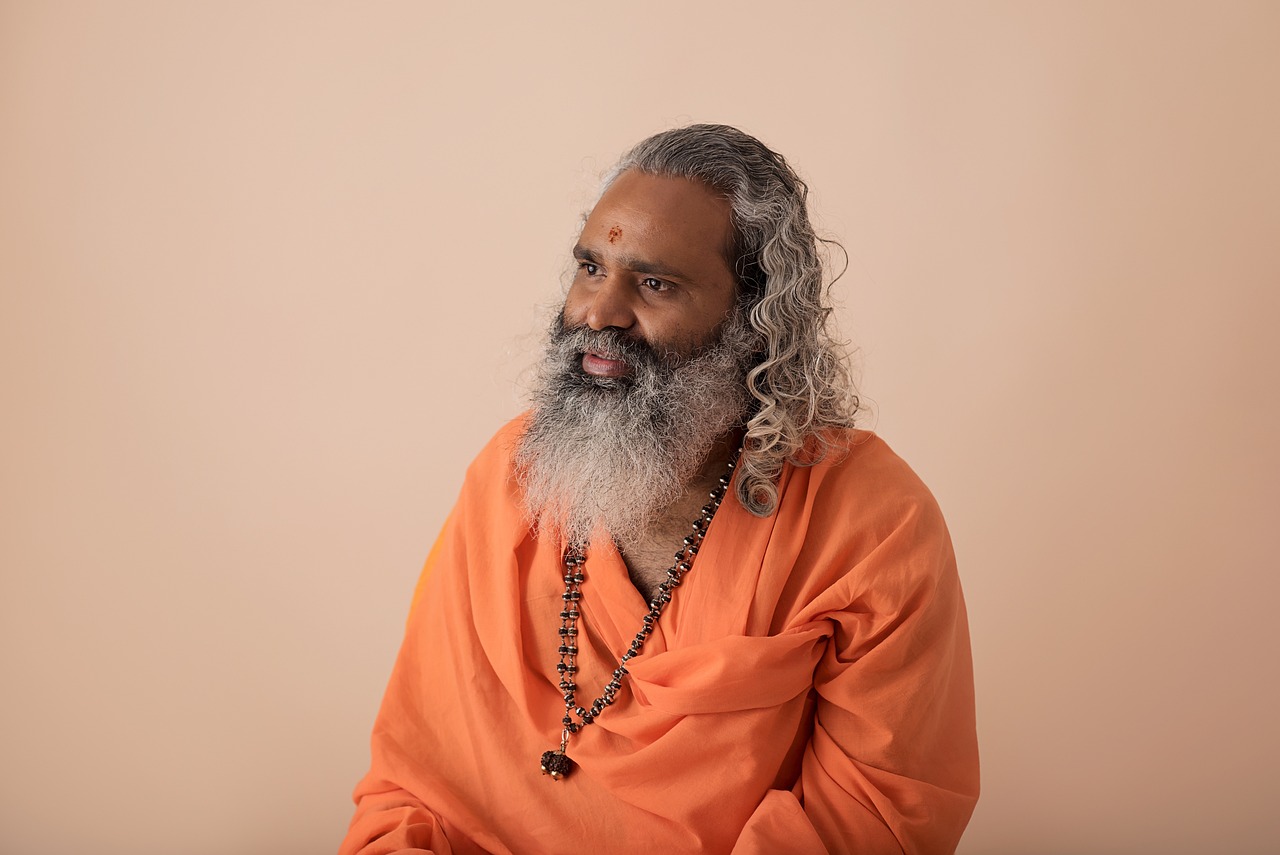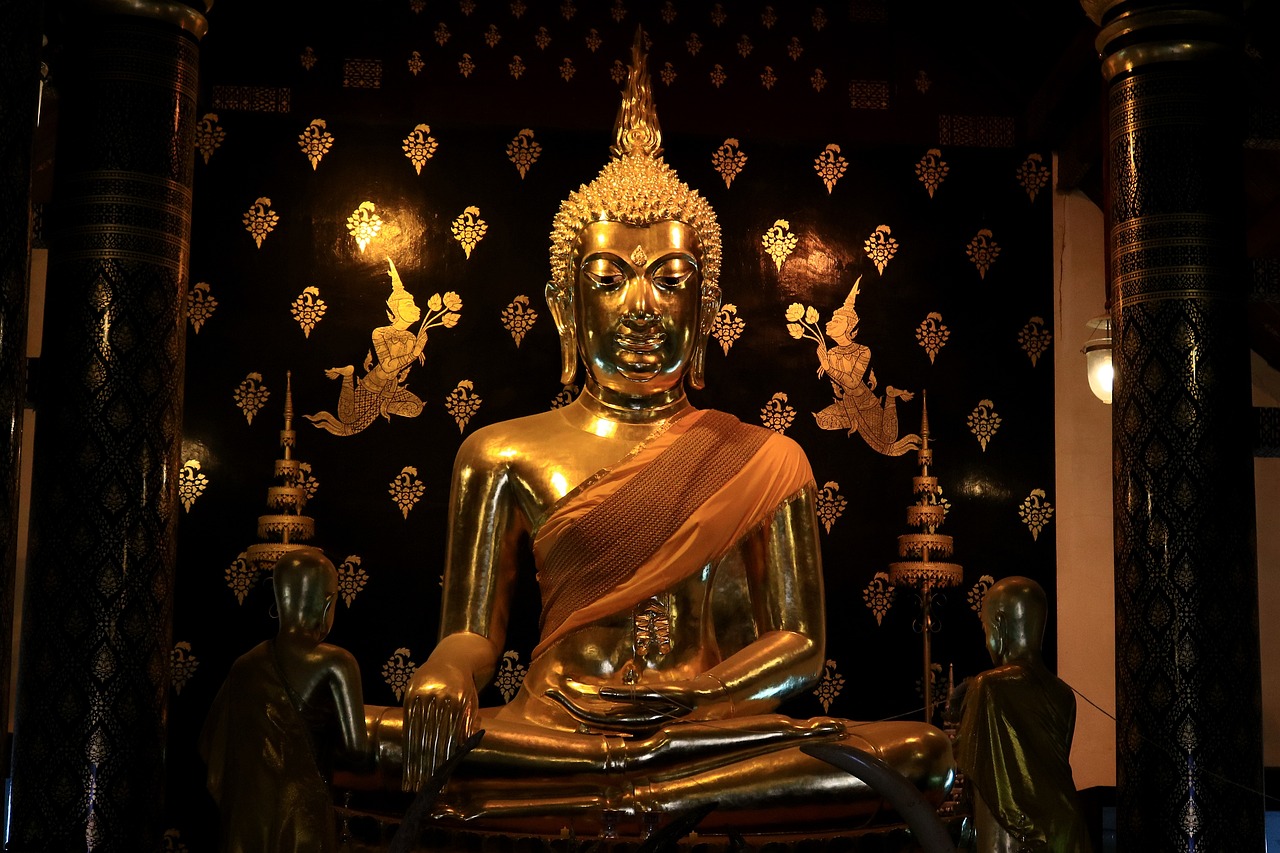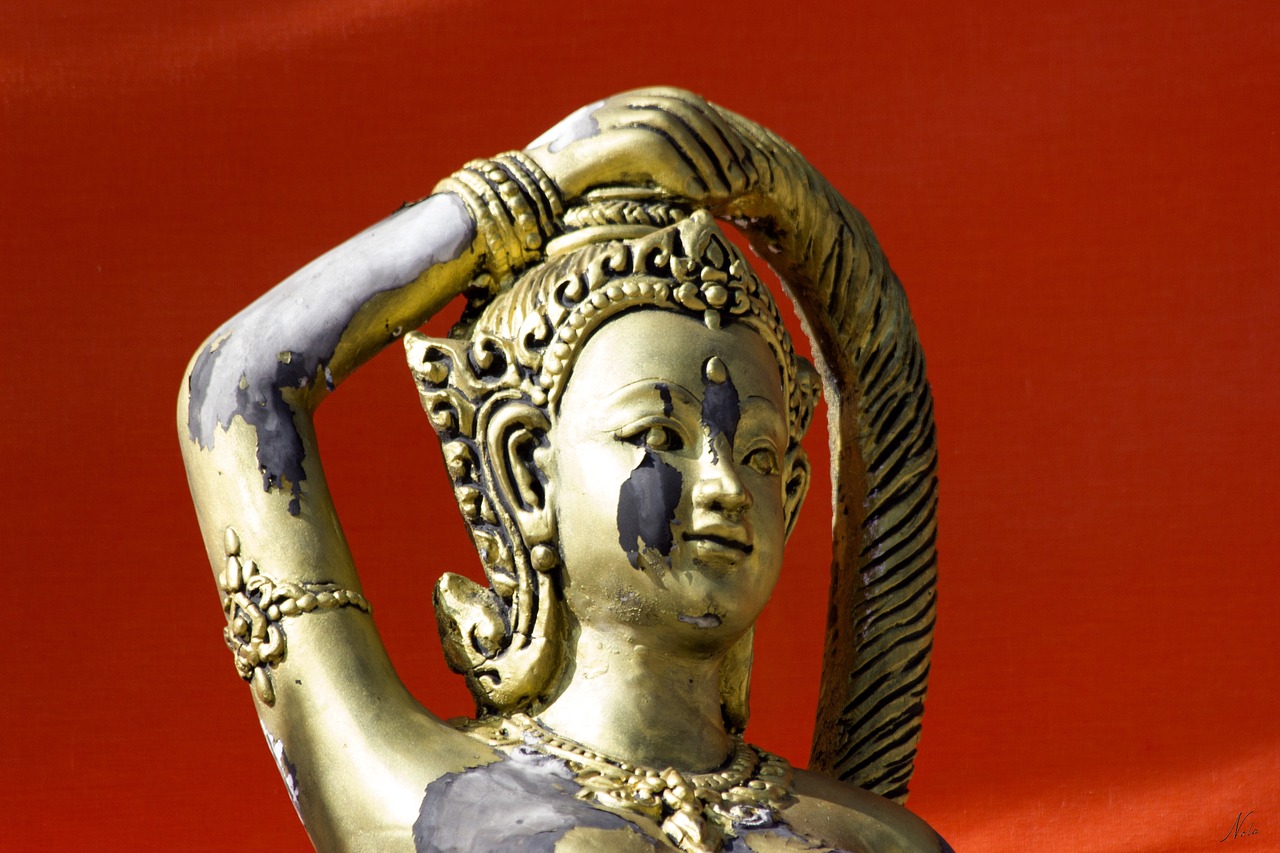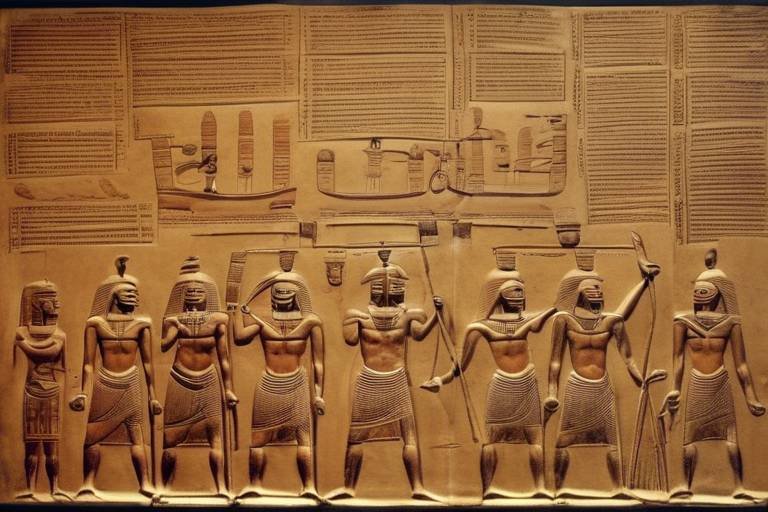The Secrets of Ancient Indian Texts and Philosophy
Embark on a journey through the mystical realms of ancient Indian texts and philosophical wisdom that have stood the test of time, offering profound insights and timeless guidance to seekers of spiritual enlightenment and self-discovery. These ancient texts serve as beacons of light, illuminating the path towards inner peace, wisdom, and transcendence.
Delve into the sacred Vedas, the oldest texts of Hinduism, brimming with hymns, rituals, and philosophical teachings that unveil the spiritual tapestry of ancient Indian civilization. These profound scriptures offer a glimpse into the cosmic order, the nature of reality, and the interconnectedness of all living beings.
Explore the enigmatic Upanishads, mystical texts that delve deep into the essence of existence, the self, and the ultimate truth. Through contemplation and introspection, these teachings reveal the eternal truths that underpin the universe, highlighting the unity and oneness that pervade all of creation.
Unravel the spiritual guidance of the Bhagavad Gita, a sacred dialogue between Prince Arjuna and Lord Krishna that delves into the intricacies of duty, righteousness, and the path to spiritual liberation. This timeless scripture offers solace and direction in navigating life's myriad challenges with grace and wisdom.
Discover the transformative power of the Yoga Sutras of Patanjali, a foundational text on the philosophy and practice of yoga. Through the eight limbs of yoga, this ancient wisdom provides a holistic path to self-realization, inner peace, and spiritual growth, guiding practitioners towards enlightenment and self-discovery.
Immerse yourself in the ancient healing wisdom of Ayurveda, a holistic system of medicine that emphasizes the balance of mind, body, and spirit. Through herbal remedies, dietary guidelines, and lifestyle practices, Ayurveda offers a comprehensive approach to well-being, promoting harmony and vitality in every aspect of life.
Embark on the path of non-violence and compassion with Jainism, an ancient Indian religion that advocates ahimsa towards all living beings. Through self-discipline and spiritual purity, followers of Jainism seek liberation and enlightenment, embodying the principles of non-harming and reverence for all life.
Explore the profound teachings of Buddhism, a spiritual tradition founded on the principles of the Four Noble Truths and the Eightfold Path. Through mindfulness practices and the pursuit of enlightenment, Buddhism offers a path to transcend suffering and attain inner peace, guiding practitioners towards a state of profound awakening.
Dive into the philosophical depths of Vedanta, a system of thought based on the Upanishads that explores the nature of reality and the self. Through self-inquiry, meditation, and realization of oneness with the divine, Vedanta advocates the path of spiritual awakening and the realization of universal consciousness.

The Vedas: Oldest Sacred Texts
The Vedas are revered as the oldest sacred texts of Hinduism, embodying a vast collection of hymns, rituals, and philosophical teachings that date back thousands of years. These ancient scriptures are considered the foundation of Indian spiritual wisdom, offering profound insights into the cosmic order, metaphysical concepts, and ethical principles that govern human existence.
Composed in Sanskrit, the language of ancient India, the Vedas are divided into four main collections: the Rigveda, Yajurveda, Samaveda, and Atharvaveda. Each Veda serves a specific purpose, ranging from hymns of praise and ritual formulas to chants for meditation and philosophical reflections on the nature of reality.
Within the Vedas, one can find intricate descriptions of the gods and goddesses of Hindu mythology, detailed instructions for performing sacrificial ceremonies, and contemplative verses that explore the mysteries of creation and the interconnectedness of all life forms. The profound wisdom contained in the Vedas continues to inspire spiritual seekers and scholars alike, shedding light on the timeless truths that transcend the boundaries of time and space.

Upanishads: Mystical Teachings
Exploring the profound wisdom and knowledge hidden within the ancient Indian texts and philosophical teachings that continue to inspire and guide individuals in their quest for spiritual enlightenment and self-discovery.
The Upanishads are a collection of mystical texts that delve into the nature of reality, the self, and the ultimate truth. These profound teachings offer insights into the interconnectedness of all beings and the universe, guiding seekers on a spiritual journey towards self-realization and enlightenment.

Bhagavad Gita: Spiritual Guidance
Exploring the profound wisdom and knowledge hidden within the ancient Indian texts and philosophical teachings that continue to inspire and guide individuals in their quest for spiritual enlightenment and self-discovery.
Delve into the Vedas, the oldest sacred texts of Hinduism, containing hymns, rituals, and philosophical teachings that provide insights into the ancient Indian civilization's spiritual beliefs and practices.
Explore the Upanishads, a collection of mystical texts that delve into the nature of reality, the self, and the ultimate truth, offering profound insights into the interconnectedness of all beings and the universe.
Unravel the teachings of the Bhagavad Gita, a sacred Hindu scripture that presents a dialogue between Prince Arjuna and Lord Krishna on duty, righteousness, and the path to spiritual liberation, offering timeless guidance for life's challenges.
Discover the Yoga Sutras of Patanjali, a foundational text on the philosophy and practice of yoga, outlining the eight limbs of yoga as a holistic path to self-realization, inner peace, and spiritual growth.
Learn about Ayurveda, the ancient Indian system of medicine that emphasizes a holistic approach to health and well-being based on the balance of mind, body, and spirit, incorporating herbal remedies, dietary guidelines, and lifestyle practices.
Explore Jainism, an ancient Indian religion that advocates non-violence, compassion, and self-discipline, emphasizing the importance of ahimsa (non-harming) towards all living beings and the pursuit of spiritual purity and liberation.
Examine the teachings of Buddhism, a profound spiritual tradition founded by Siddhartha Gautama (the Buddha), focusing on the Four Noble Truths, the Eightfold Path, and mindfulness practices as a means to attain enlightenment and transcend suffering.
Dive into Vedanta, a philosophical system based on the Upanishads that explores the nature of reality, the self, and the ultimate truth of Brahman (universal consciousness), advocating the path of self-inquiry, meditation, and realization of oneness with the divine.
The Bhagavad Gita, often referred to as the Gita, is a profound scripture that offers spiritual guidance and wisdom for navigating life's challenges. It presents a dialogue between Prince Arjuna and Lord Krishna on the battlefield of Kurukshetra, where Arjuna is confused and morally troubled about fighting in the battle.
Lord Krishna imparts timeless teachings on duty, righteousness, and the path to spiritual liberation, emphasizing the importance of selfless action and devotion to God. The Gita addresses fundamental questions about life, duty, and the nature of reality, providing insights into the essence of existence and the pursuit of spiritual fulfillment.
Through the Bhagavad Gita, individuals are encouraged to cultivate inner strength, clarity of purpose, and a deep connection to their spiritual essence. It serves as a guide for ethical living, self-realization, and the attainment of inner peace amidst life's challenges and uncertainties.

Yoga Sutras: Path to Enlightenment
The Yoga Sutras of Patanjali are a profound and foundational text on the philosophy and practice of yoga, offering a comprehensive guide to achieving self-realization, inner peace, and spiritual growth. These ancient teachings outline the eight limbs of yoga, providing a holistic path towards enlightenment and self-discovery.
At the core of the Yoga Sutras is the emphasis on discipline, self-awareness, and mindfulness as key components in the journey towards enlightenment. By practicing the principles outlined in the Sutras, individuals can cultivate a deeper connection with their inner selves and the universal consciousness.
Patanjali's Yoga Sutras not only offer a practical guide to physical postures (asanas) but also delve into the psychological and spiritual aspects of yoga practice. Through practices such as meditation, breath control, and ethical living, individuals can align their mind, body, and spirit to achieve a state of harmony and balance.
One of the central themes of the Yoga Sutras is the concept of Samadhi, which refers to a state of transcendental consciousness where the individual experiences a profound sense of unity with the divine. This state of enlightenment is considered the ultimate goal of yoga practice, leading to liberation from suffering and the cycle of rebirth.
By following the teachings of the Yoga Sutras and incorporating them into daily life, individuals can embark on a transformative journey towards self-discovery, inner peace, and spiritual enlightenment. The path to enlightenment, as outlined in the Sutras, is not just a physical practice but a profound journey of self-exploration and growth.

Ayurveda: Ancient Healing Wisdom
Ayurveda, an ancient Indian system of medicine, offers profound insights into holistic healing and well-being. Rooted in the concept of balance between mind, body, and spirit, Ayurveda emphasizes personalized health approaches tailored to individual constitutions, known as doshas. These doshas, namely Vata, Pitta, and Kapha, govern various aspects of our physical and mental well-being, and maintaining their equilibrium is essential for optimal health.
Ayurvedic practices encompass a wide range of modalities, including herbal remedies, dietary guidelines, lifestyle practices, and therapeutic treatments such as massage (Abhyanga) and detoxification (Panchakarma). By addressing the root cause of ailments rather than just symptoms, Ayurveda aims to restore harmony and promote longevity through natural healing methods.
Central to Ayurvedic philosophy is the belief that health is not merely the absence of disease but a state of vibrant well-being achieved through alignment with nature's rhythms and cycles. By cultivating awareness of one's unique constitution and making conscious choices in diet, lifestyle, and daily routines, individuals can harness the innate healing power within themselves and prevent imbalances before they manifest as illness.
Ayurveda's wisdom extends beyond physical health to encompass mental and emotional well-being, recognizing the interconnectedness of the body, mind, and spirit. Practices such as meditation, yoga, and pranayama are integral to Ayurveda, promoting inner harmony, emotional resilience, and spiritual growth.
In Ayurveda, every individual is viewed as a microcosm of the universe, with a unique constitution and purpose in life. By aligning with the natural elements and rhythms of the cosmos, one can tap into the universal life force (Prana) and experience profound healing and transformation on all levels of being.

Jainism: Path of Non-Violence
Jainism, an ancient Indian religion, offers a unique path of non-violence, compassion, and self-discipline to its followers. At the core of Jain teachings lies the principle of ahimsa, which emphasizes non-harming towards all living beings. This philosophy extends beyond physical harm to include thoughts, words, and actions, promoting a lifestyle of peace and harmony with all creatures.
Central to Jainism is the belief in the interconnectedness of all life forms and the idea that every being possesses a soul. Followers of Jainism strive to cultivate compassion and empathy towards all living beings, practicing kindness and respect towards even the smallest creatures. By embracing non-violence in all aspects of life, Jains seek to purify their souls and attain spiritual liberation.
Jain teachings also emphasize self-discipline and self-control as essential practices on the path to spiritual enlightenment. Through practices such as fasting, meditation, and introspection, followers of Jainism aim to overcome desires, attachments, and ego, leading to a deeper understanding of the self and the universe.
Furthermore, Jainism advocates for simplicity and minimalism, encouraging its followers to live a life of moderation and non-attachment to material possessions. By renouncing worldly desires and embracing a minimalist lifestyle, Jains seek to free themselves from the cycle of rebirth and achieve spiritual purity.
In Jain philosophy, the ultimate goal is to attain moksha, liberation from the cycle of birth and death, and achieve a state of eternal bliss and enlightenment. By following the path of non-violence, compassion, and self-discipline, Jains strive to transcend the limitations of the material world and realize their true spiritual potential.

Buddhism: Teachings of Enlightenment
When it comes to exploring the profound teachings of ancient Indian texts and philosophy, Buddhism stands out as a profound spiritual tradition that offers deep insights into the nature of existence and the path to enlightenment. Founded by Siddhartha Gautama, known as the Buddha, Buddhism is centered around the Four Noble Truths, the Eightfold Path, and mindfulness practices that aim to help individuals transcend suffering and attain spiritual awakening.
The essence of Buddhism lies in understanding the impermanent nature of life and the inherent suffering that comes with attachment and desire. The Four Noble Truths encapsulate the fundamental teachings of Buddhism, emphasizing the reality of suffering, the origin of suffering through craving, the cessation of suffering by letting go of attachments, and the path to end suffering through the Eightfold Path.
The Eightfold Path serves as a practical guide for leading a mindful and virtuous life, encompassing principles such as right understanding, right intention, right speech, right action, right livelihood, right effort, right mindfulness, and right concentration. By following these ethical and mental disciplines, individuals can cultivate wisdom, ethical conduct, and mental discipline to attain spiritual liberation.
Mindfulness practices play a crucial role in Buddhism, encouraging individuals to cultivate present-moment awareness and non-judgmental acceptance of their thoughts, emotions, and experiences. Through practices such as meditation, contemplation, and self-reflection, practitioners can develop clarity of mind, emotional balance, and insight into the nature of reality.
Overall, Buddhism offers a profound path to enlightenment by guiding individuals towards self-discovery, inner peace, and spiritual awakening. By embracing the teachings of the Buddha and incorporating mindfulness practices into their daily lives, individuals can embark on a transformative journey towards liberation from suffering and the realization of their true nature.

Vedanta: Philosophy of Oneness
Vedanta is a profound philosophical system rooted in the ancient Indian texts known as the Upanishads. It delves deep into the nature of reality, the self, and the ultimate truth of Brahman, which is considered universal consciousness. The philosophy of Vedanta advocates the path of self-inquiry, meditation, and the realization of oneness with the divine. It emphasizes the interconnectedness of all beings and the universe, promoting harmony and unity.
Within Vedanta, the concept of Advaita (non-dualism) is central, asserting that there is ultimately no distinction between the individual soul (Atman) and the universal soul (Brahman). This realization of oneness leads to spiritual liberation and the transcendence of the ego, allowing individuals to experience the true nature of reality beyond the illusions of the material world.
Through the study and contemplation of Vedanta, practitioners seek to understand the underlying unity that pervades all existence, recognizing the divine essence within themselves and others. The philosophy encourages self-reflection, introspection, and the cultivation of virtues such as compassion, wisdom, and love in order to awaken to the profound truth of oneness.
As one delves deeper into the teachings of Vedanta, they embark on a transformative journey of self-discovery and spiritual growth, realizing that the ultimate reality is a boundless ocean of consciousness in which individual identities dissolve, and the pure essence of existence shines forth.
Frequently Asked Questions
- What are the Vedas?
The Vedas are the oldest sacred texts of Hinduism, consisting of hymns, rituals, and philosophical teachings that provide insights into ancient Indian spiritual beliefs and practices.
- What is the significance of the Bhagavad Gita?
The Bhagavad Gita is a sacred Hindu scripture that presents a dialogue between Prince Arjuna and Lord Krishna on duty, righteousness, and the path to spiritual liberation, offering timeless guidance for life's challenges.
- How does Ayurveda differ from modern medicine?
Ayurveda is an ancient Indian system of medicine that emphasizes a holistic approach to health and well-being, focusing on the balance of mind, body, and spirit through herbal remedies, dietary guidelines, and lifestyle practices, while modern medicine often targets specific symptoms with pharmaceutical drugs.
- What is the core teaching of Buddhism?
Buddhism emphasizes the Four Noble Truths, the Eightfold Path, and mindfulness practices as a means to attain enlightenment and transcend suffering, with the ultimate goal of reaching a state of liberation and inner peace.
- How does Jainism promote non-violence?
Jainism advocates non-violence, compassion, and self-discipline, emphasizing ahimsa (non-harming) towards all living beings and the pursuit of spiritual purity and liberation through ethical living and meditation.



















